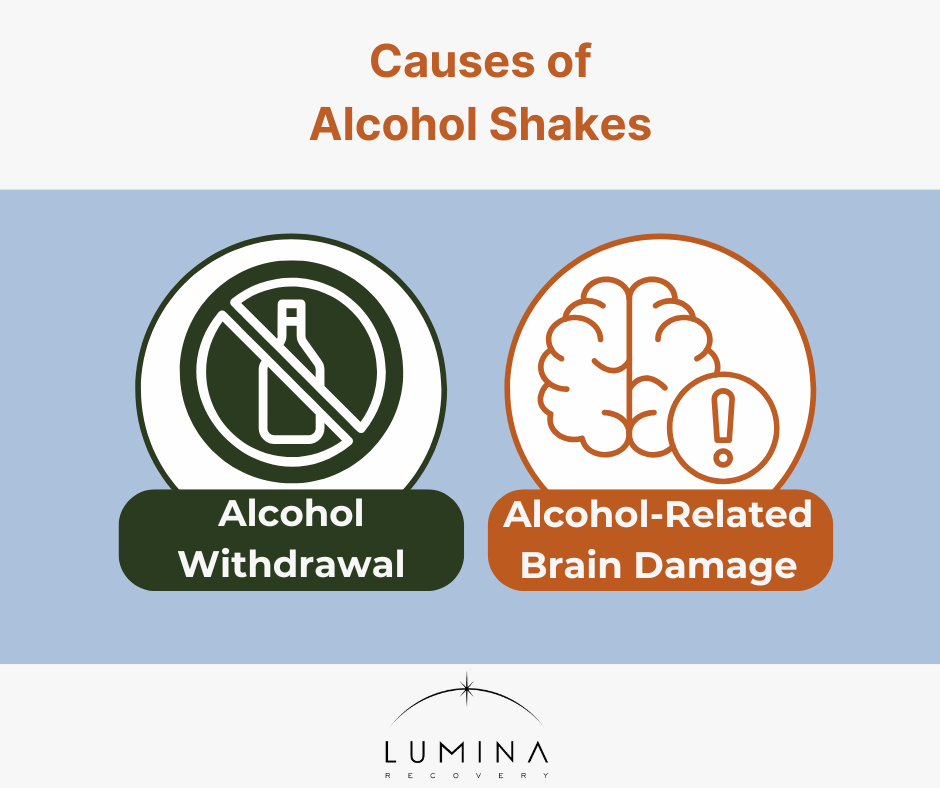No, experiencing alcohol shakes does not automatically mean you are an alcoholic, but it can be a sign of alcohol dependence or withdrawal.
They occur when the nervous system reacts to alcohol leaving the body, and while they are common in heavy drinkers, they can also affect those who consume alcohol occasionally.
Understanding the causes of alcohol shakes can help determine whether they indicate a deeper issue related to alcohol dependence or another medical condition. We will explore what alcohol shakes are, their causes, and when they may be a sign of alcoholism.
What Are Alcohol Shakes?
Alcohol shakes, also known as alcohol tremors, are a form of tremor that results from the body’s nervous system being affected by alcohol consumption and withdrawal. They typically occur as a withdrawal symptom when a person stops drinking after prolonged or heavy use.
However, their severity can vary significantly, from mild shaking in occasional drinkers to severe, persistent tremors in those with chronic alcohol addiction.
Alcohol Shakes vs. Other Tremors
It’s important to differentiate alcohol-related tremors from other types of shakes:
- Anxiety-related tremors: Often temporary and triggered by stress.
- Essential tremors: A neurological condition that causes shaking without alcohol involvement.
- Parkinson’s disease tremors: A movement disorder that worsens over time and has distinct symptoms beyond tremors.
- Medication side effects: Some prescription drugs cause tremors as a side effect.
- Blood sugar imbalances: Hypoglycemia (low blood sugar) can cause shaking, especially in diabetics.

Causes of Alcohol Shakes
Alcohol shakes can be distressing and are often a sign that the body is reacting to changes in alcohol consumption. Understanding what causes these tremors can help individuals determine whether they are experiencing withdrawal or another underlying issue.
1. Alcohol Withdrawal
When someone stops drinking after prolonged alcohol use, the nervous system, which has adapted to alcohol’s depressant effect, becomes overactive. This can cause the brain to send incorrect signals to the nerves, leading to involuntary shaking, particularly in the hands and fingers.1
These tremors typically occur within hours after the last drink and may persist until the body stabilizes.
2. Alcohol-Related Brain Damage
Long-term alcohol use can cause damage to the brain and nervous system, interfering with the way the brain communicates with muscles and nerves. This disruption can result in persistent tremors, even when a person is not actively withdrawing from alcohol.
These tremors may indicate underlying neurological impairment due to chronic alcohol consumption.1
Understanding the cause of alcohol shakes is essential in determining whether they are a
temporary withdrawal symptom or a sign of long-term alcohol-related damage.
Do Alcohol Shakes Indicate Alcoholism?
While alcohol shakes are commonly linked to withdrawal symptoms in individuals with alcohol dependence, they are not always a definitive symptom of alcoholism.
Many factors contribute to alcohol shakes, including excessive alcohol consumption, binge drinking, and the body’s reaction to stopping alcohol intake. The severity of tremors can vary from person to person, depending on their drinking patterns, overall health, and whether they have developed alcohol dependence.
For some, alcohol shakes may occur only after consuming large amounts of alcohol, while for others, they may be an early warning sign of alcohol withdrawal symptoms. In severe cases, alcohol tremors can be a symptom of delirium tremens (DTs), a life-threatening condition requiring immediate medical attention.
It is important to understand that alcohol shakes are not exclusive to heavy drinking or those with long-term alcohol addiction. Seeking professional help can provide clarity and support for those unsure of what their symptoms mean.

How to Stop Alcohol Shakes Safely
If you or a loved one is experiencing alcohol-related tremors, taking the right steps is crucial.
Short-Term Relief
- Hydration: Drinking water can help restore balance.
- Nutrition: Eating nutrient-rich foods helps stabilize blood sugar levels.
- Rest: Getting proper sleep and reducing stress can minimize shakes.
When to Seek Medical Help
Alcohol withdrawal can be dangerous. Seek professional help if you have the following signs of alcohol withdrawal:1
- Severe tremors lasting more than 48 hours after the last drink
- Confusion, hallucinations, or seizures
- Rapid heart rate
- High blood pressure (hypertension)
- Severe nausea and vomiting
- Sudden mood changes, including depression and anxiety
- Sweating and persistent headaches
- Difficulties sleeping or insomnia
Long-Term Solutions
If alcohol shakes are a recurring problem, professional treatment can help:
- Medically Supervised Detox: Provides a safe environment for withdrawal management.
- Inpatient or Outpatient Treatment: Offers therapy and medical support for recovery.
- Therapy: Cognitive behavioral therapy (CBT), dialectical behavior therapy (DBT), and medication-assisted treatment (MAT) help address the underlying causes of alcohol dependence.
FAQs
Can alcohol shakes be a sign of something other than withdrawal?
Yes. While alcohol shakes are commonly associated with withdrawal, they can also be caused by anxiety, neurological disorders, medication side effects, and low blood sugar levels. If tremors persist, it is important to consult a medical professional to determine the underlying cause.
How long do alcohol shakes last?
Alcohol shakes usually last between a few hours to a couple of days, depending on the severity of withdrawal.
Can alcohol shakes be permanent?
In most cases, alcohol shakes subside with detox. However, long-term alcohol use can cause nerve damage, leading to persistent tremors.
Do all heavy drinkers get shakes?
Not necessarily. Some individuals are more prone to withdrawal symptoms, while others may not experience noticeable tremors.
What is the fastest way to stop alcohol shakes?
Hydration, proper nutrition, and rest can help, but if symptoms are severe, medical supervision is the safest option.
Find Stability and Support With Lumina Recovery
Alcohol shakes can be a warning sign of withdrawal, but they don’t necessarily mean someone is an alcoholic. If tremors persist or are accompanied by other withdrawal symptoms, seeking professional guidance is crucial.
At Lumina Recovery, we offer medically supervised detox and individual therapy to help manage alcohol dependency safely.
If you or a loved one is experiencing withdrawal symptoms, contact Lumina Recovery today for a confidential consultation.
Source:
- Medical News Today. Understanding alcohol “shakes” and tremors.


